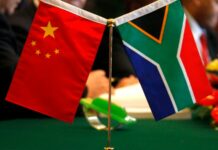
[miningmx.com] — DATO Rajah Zainal represents the money behind Aurora Empowerment Systems. He’s also an executive director of the gold company and agreed to meet with Miningmx reporters in Sandton, Johannesburg a few weeks ago.
Zainal strikes an unassuming figure, but he is a notable banker/entrepreneur. He started the Offshore Islamic Bank and has been involved in a number of Islamic banking initiatives. For this, he bears the honorific, “Dato’ for services to his country, a bit like a knighthood. Why, then, is he investing millions of rands in some of South Africa’s worst gold mines?
Answers are hard to find on certain points. Zainal says his first contact with South African gold was with Khulubuse Zuma, Aurora’s chairman and nephew of the current South African president although I’ still uncertain how their paths crossed. In any event, Zondwa Mandela, the grandson of the former president, and the CEO of Aurora, came into the Aurora mix some time later.
For his part, Zainal says it was an interest in the continuing rising gold price that drove the investment in Aurora which, since August, has spent R1bn buying South African gold assets.
That’s not an insignificant investment, but the nagging question is how Aurora’s investors – described by Zainal only as Malaysian and Gulf (including Saudi Arabia) interests – intend to recover their money. Where’s the payback?
The assets under Aurora’s belt are, to be honest, all dogs, or have doggie characteristics. One, Grootvlei, dipped in and out of profitmaking even when it was considered a decent going concern in the Nineties, then operated by Peter Flack’s Randgold. Aurora also owns Pamodzi Gold’s Orkney mines, which rarely made money, and an additional 60% stake in DRDGOLD’s Blyvoor operation, another troublesome mine. These are not easy assets.
Zainal speaks of operating them differently and installing corporate governance checks they didn’t have before as if this is going to change the fact that Orkney was virtually picked clean by former owner, Harmony Gold. And while Mandela and Zuma cut an impressive political image, there’s little evidence Aurora has the mining team – of the ilk of Pamodzi’s Ken Steenkamp – who can make these assets finally sing. One just wonders.
Aurora’s plan is to recapitalise the mines and hopefully make the Orkney operations feasible by having their ore treated by mills Aurora owns by dint of its most recent acqusition, the R20m purchase of ERPM’s processing plant. Once dubbed a grand old lady, the century-old ERPM is really a relic or fossil of when South Africa dominated the world’s gold industry. But its mills will slash Orkney’s cost base heavily, removing the need for expensive trucking and milling at AngloGold Ashanti – a major downer for Pamodzi Gold when it was still operating.
But the other nagging question I can’t shake is: why? Why, if as Zainal explains investors wanted exposure to gold, their attention should fall on South Africa? Why not Russia, or China? Why not, in fact, an ETF or the metal itself?
Why bother with the stress and toil of operating some of South Africa’s dodgiest assets, and unsafe ones. Already, another Aurora acquisition, Primrose, has suffered underground fatalities while at Grootvlei a female miner was dragged through a tail pulley while helping operate a conveyer.
Zainal says a listing will come. Recapitalisation of the mines will partly be through a bond, which I assume will be convertible into shares at the point of IPO. But I hope the plan is that the investors behind Aurora is not to turn a profit once listed on the JSE. Perhaps Aurora’s arrival is a stunning call on the rand? Improving the rand gold price means everything to these assets.
DRDGOLD
Let’s take Aurora at face value, which seems to be the approach of Niel Pretorius, CEO of DRDGOLD. DRDGOLD has struck a relationship with Aurora by dint of the recent Blyvoor and the ERPM deals conducted between the two.
“There’s no reason to doubt Aurora,’ says Pretorius who has already received the first (R5m) cheque from Aurora. “It is a relationship and we will be a good partner to them. But it’s too early to call whether the relationship will develop,’ he says.
In the meantime, Pretorius is dwelling on important strategic questions of DRDGOLD’s.
The big question is where to from here. The company has effectively become a surface operator having divested from its underground assets. For institutional investors, this is great news because DRDGOLD is shock-free (well, almost), producing stable cash flow, and sustainable profits.
But Pretorius declares himself watchful of expectations of the significant retail investors, particularly in the US. These are the followers of South African gold believing investment in the stocks offers massive leverage should the rand gold price suddenly improve. The old marginal mining investment case.
“There is a disconnect between the assets we have and the investors,’ he says. “Investors will start insisting that we do something.’
Pretorius also believes the board will have to act decisively on DRDGOLD’s strategic future. Where does it go to from here?
A deeper partnership with Aurora is, obviously at this stage, not envisioned but it’s a relationship to be watched.











